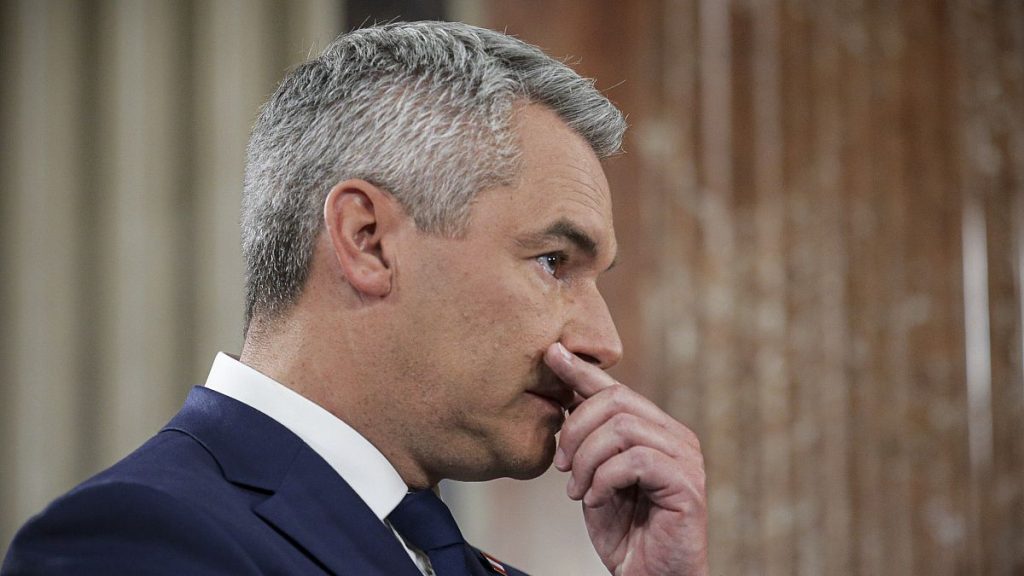The Austrian political landscape is in turmoil following the collapse of coalition talks, leaving the nation facing the prospect of fresh elections. Chancellor Karl Nehammer announced his impending resignation after negotiations between his conservative Austrian People’s Party (ÖVP), the center-left Social Democrats (SPÖ), and the liberal Neos party failed to produce a governing coalition. This marks the second unsuccessful attempt to form a government since the September elections, which saw the right-wing Freedom Party (FPÖ) emerge as the largest party, albeit without enough support to govern alone. The breakdown stems from disagreements on key policy issues, particularly economic strategies and potential tax reforms.
The failed negotiations highlight the deep divisions within Austrian politics. The ÖVP and SPÖ, traditionally the dominant forces, have struggled to find common ground with other parties, particularly given the FPÖ’s electoral success and their reluctance to include the far-right party in a coalition due to concerns about its leader, Herbert Kickl. The Neos party, initially seen as a potential kingmaker, withdrew from the talks citing a lack of progress on fundamental reforms, further complicating the situation and ultimately leading to the collapse of the negotiations altogether. The different parties’ divergent economic visions, especially regarding budget deficit reduction and future taxation policies, proved insurmountable obstacles to forming a stable coalition.
The primary point of contention revolves around the substantial budget deficit inherited from the previous government. The SPÖ, under leader Andreas Babler, emphasized the need to address this deficit, while the ÖVP expressed reservations about measures that could impede economic competitiveness or entail new taxes. This fundamental difference in economic approach ultimately proved irreconcilable, despite Babler’s attempts to salvage the negotiations and continue discussions. The Neos party, while not explicitly citing the budget deficit as their reason for withdrawing, likely found the lack of consensus on this critical issue a significant barrier to achieving the “fundamental reforms” they sought.
The political impasse has effectively sidelined the FPÖ, despite its victory in the September elections. Other parties have consistently refused to collaborate with FPÖ leader Herbert Kickl, citing his controversial stances and past actions. This “Kickl prevention strategy,” as Kickl himself has termed it, has forced the ÖVP and SPÖ to seek coalition partners among smaller parties, a strategy that has proven unsuccessful. Kickl has criticized the protracted negotiations and the other parties’ focus on excluding him, arguing that it has led to instability and wasted valuable time. The FPÖ now anticipates new elections, confident that recent opinion polls suggesting a surge in their support will further strengthen their position.
The prospect of new elections brings its own set of challenges. The FPÖ’s likely gains could further complicate the formation of a future government, given other parties’ reluctance to partner with them. Moreover, Austria faces significant economic headwinds, including a two-year recession, rising unemployment, and a budget deficit exceeding EU limits. The next government, regardless of its composition, will need to address these pressing economic issues, implement necessary reforms, and navigate the complex political landscape. The EU Commission has estimated that Austria needs to save between €18-24 billion, a daunting task that will require difficult decisions and potentially unpopular measures.
Austria’s political future remains highly uncertain. The failure of coalition talks and the impending resignation of Chancellor Nehammer underscore the deep divisions and the difficulty in forging a stable government. The FPÖ, despite its electoral success, remains isolated due to other parties’ refusal to collaborate with its leader. New elections appear inevitable, but they may not provide a clear solution, potentially leading to further prolonged negotiations and political instability. The incoming government, whoever leads it, will face the formidable challenge of navigating a complex political landscape while simultaneously addressing pressing economic concerns and implementing necessary reforms to stabilize the nation’s finances and steer it towards sustainable growth. The task ahead is daunting, and the stakes are high for Austria’s future.














